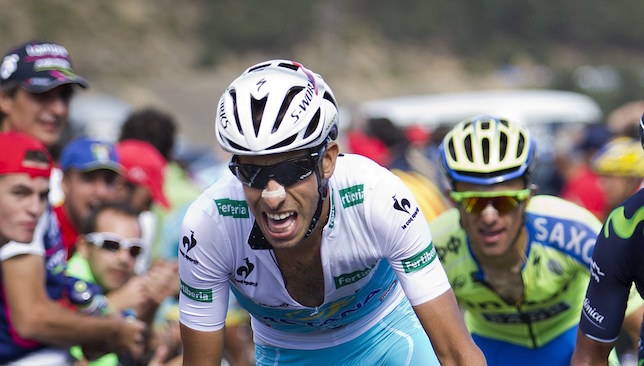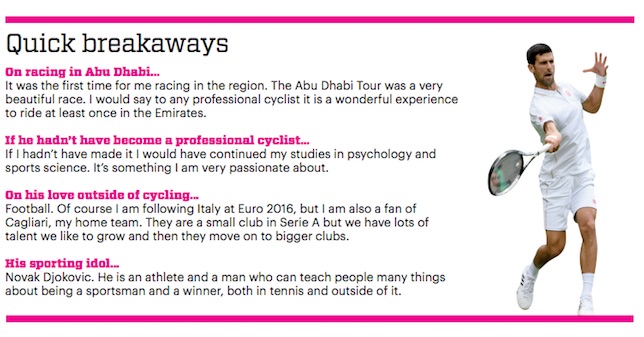
One of the great complexities of cycling is that it is an individual sport within that of a team framework. That is, in the case of the General Classification, eight riders helping one man get over the line as the No. 1.
In theory, only one gets the glory, the accolades and the adulation, the rest have to remain subservient. It’s what sets it apart from almost every other team sport. But as Astana prepare for the start of the Tour de France on Saturday, two individual members of their team immediately stand out: Fabio Aru and Vincenzo Nibali.
The latter is a four-time Grand Tour winner and Le Tour champion two years ago; Aru is competing for the maillot jaune for the first time, however he is the one who will be assuming the role of Capitano; Nibali domestique – a term that translates as servant.
It makes for a curious and fascinating dynamic in arguably the race’s strongest overall team, especially as Nibali – in March told La Gazzetta dello Sport that Aru, six years his junior, “often gets upset and he’s short-tempered” and “never asks anything; he doesn’t consider you. He trusts other people.”
With Nibali believed to be on his way to proposed Bahrain-sponsored team at the end of the season, and Aru long earmarked as the future of the Astana there is a symbolic passing of the baton in play.
The question remains, though: can Nibali be a No. 2? Just four years ago a similar situation unfolded at Team Sky with clear tension between Bradley Wiggins and Chris Froome and, like Nibali, the more experience rider hinted at a lack of trust.
-4 to #TDF2016
— BYXEE (@ByxeePro) June 28, 2016
in hunting for the final podium there will be Fabio #Aru, Astana Team new captain. pic.twitter.com/lRwIlQOlcO
However, speaking to Sport360 on the eve of Le Tour, Aru insists his relationship with the man known as ‘Lo Squalo’ – the Shark – remains strong and there is a common goal bringing them together that goes beyond France, as he and his fellow Italian hunt gold as well as yellow, even using that all important word: trust.
“The relationship with Vincenzo is very good, we are good team-mates. You have to be professional both on and off the bike, even with our different characteristics,” he says. “I really respect Vincenzo as an athlete and a team-mate, and remember we will be competing together for Italy at the Olympics so this will be a good situation for us to work together with Rio in mind.
“Do I feel extra pressure as capitano? No, because I have raced the Giro and Vuelta and did well so it isn’t a huge step up for me. Secondly, I have Vincenzo with me. He has already won the Tour so I know I can trust on him as an important team-mate.”
Aru’s presence has been a long-time coming at this event. He’s certainly raced up the ranks since signing for Astana in 2012. A year after helping Nibali win the 2013 Giro d’Italia in his first Grand Tour, he took third place at the race and then served further notice of his talent with a fifth-place at the Vuelta a Espana later that year; Nibali capturing his Tour de France crown in between.
Since then he’s never been off the podium, finishing second in 2015 behind one of his idols Alberto Contador and claimed the Vuelta with a brilliant attack in the penultimate stage to topple Tom Dumoulin of the Netherlands.

The time is now right for the Sardinian to have a crack at the Tour, although it’s not been a vintage year for the 25-year-old. He didn’t win a stage race in the spring and his only victory was in Stage 3 at the Criterium du Dauphine; a surprise given it was thought to favour the sprinters.
Aru, though, has brushed off his unremarkable form and lack of Tour miles. He does admit, however, that while physically ready, the extra attention and focus on the race will be a totally new experience.
“I am very motivated. I am really excited to participate in the Tour,” he adds. “I feel my preparation has been as good as it can be with my training camps in the Italian Alps so I’m looking forward to the start. It is another three-week race, another Grand Tour, something I have experience of with the Vuelta and the Giro.
“Each one has its own characteristics and different type of challenge for an athlete but if I can identify one aspect of the Tour which stands it out from the others it is the level and strength of the field, it is extremely high. Also, and I only know this from speaking to my team-mates, the media attention and pressure is that much higher.”
That strong field he speaks of is one of the most stacked for years: two-time winner Chris Froome, two-time runner-up Nairo Quintana, 2007 and 2009 champion Contador, Nibali – albeit in a reduced role (for now) – BMC’s dual attack of Richie Porte and Tejay van Garderen plus the French contingent led by Thibau Pinot and Romain Bardet.
“It’s so difficult to mark out one rival as being stronger than the other: Contador, Froome, Quintana, (Joaquim) Rodriguez… there is no one in particular, they are all great riders. Also, the French riders like Pinot and Bardet, they have been competing very well,” he admits. “It’s practically impossible to call a favourite or predict the winner because you know most, if not all, of them will be out front for most of the race, fighting for the GC.”
The route for the 103rd Tour favours climbers like Aru with a return to the iconic Mount Ventoux, a visit to the Pyrenees, Andorra and the Alps.
Ventoux arrives during Stage 12 on Bastille Day and is followed by an individual time trial in the mountains – one of two ITTs – Aru feels could prove decisive.
“Some stages in the latter part of the race look particularly tough but the middle section of the race (Ventoux), will also be very important.” he says. “If I had to focus one specific part it would be the last four stages, particularly the climb at Stage 17 followed by the ITT the next day. This could decide the GC.”
As to how Aru will overcome such a deep and varied field to become the first debutant winner since Laurent Fignon in 1983, he said: “We will see step by step, stage by stage. It’s my first time at the Tour, I am trying to maintain a low profile. In Italy we say, “tenere i piedi per terra”, which is about keeping your feet on the ground, especially important when approaching a race of this gravitas.
“I will see how the race develops. But with so many great riders every single stage from 1-21 is important if you want to win the GC.”
It sounds like he’s been taking advice from someone.